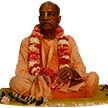Without Knowledge - an essential subject: Difference between revisions
(Created page with "Category:Essential Subjects <!----------------------- edit below this line -----------------------> <!------------------------ begin introduction text below --------------...") |
(Vanibot #0041: Moves Choose Another box to the end) |
||
| Line 2: | Line 2: | ||
<!----------------------- edit below this line -----------------------> | <!----------------------- edit below this line -----------------------> | ||
<!------------------------ begin introduction text below ------------------------> | <!------------------------ begin introduction text below ------------------------> | ||
Those who are acting in the modes of passion, they'll remain in the same position as they are now, and those acting in the modes of ignorance, darkness, without any knowledge, they are being degraded in lower grades of life. This is material world. But Kṛṣṇa is advising Arjuna that either goodness or passion or ignorance, after all, they are activities of this material world. You have to come above, transcend this position of goodness also. | |||
Srila Prabhupada's books, lectures, conversations and letters offer a comprehensive presentation of this essential subject as seen in the Vaniquotes '''[[Vaniquotes:Category:Without Knowledge|Without Knowledge]]''' category. An introduction from his books is given below in the following | Srila Prabhupada's books, lectures, conversations and letters offer a comprehensive presentation of this essential subject as seen in the Vaniquotes '''[[Vaniquotes:Category:Without Knowledge|Without Knowledge]]''' category. An introduction from his books is given below in the following 8 quotes. | ||
<!-------- end introduction text and don't touch next three lines ---------> | <!-------- end introduction text and don't touch next three lines ---------> | ||
== Quotes from Srila Prabhupada's books == | == Quotes from Srila Prabhupada's books == | ||
<!----------------- edit quote boxes below this line -----------------> | <!----------------- edit quote boxes below this line -----------------> | ||
{{VaniQuotebox| | {{VaniQuotebox|Birth after birth, such asuras go still further down, finally to animal forms like those of tigers or similar ferocious beasts. Thus for millions of years they have to remain in darkness without knowledge of Krsna|In this verse it is clearly said that persons who are envious of the Supreme Personality of Godhead are the lowest of mankind and are very mischievous. Under the regulative principles of the Supreme, such mischievous persons are thrown into the darkest region of material existence and are born of asuras, or atheists. Birth after birth, such asuras go still further down, finally to animal forms like those of tigers or similar ferocious beasts. Thus for millions of years they have to remain in darkness without knowledge of Kṛṣṇa. '''(Śrīmad-Bhāgavatam 4.21.27 )'''}} | ||
{{VaniQuotebox| | {{VaniQuotebox|A living being is not the material body but an eternal part and parcel of the Supreme Being, and thus revival of his self-knowledge is essential. Without this knowledge, the human life is baffled|A living being is not the material body but an eternal part and parcel of the Supreme Being, and thus revival of his self-knowledge is essential. Without this knowledge, the human life is baffled. The servants of the Lord, Viṣṇu, are entrusted with this responsible work, and so they wander over the earth and to all other planets in the universe. Thus the knowledge which was received by Uddhava directly from the Lord deserves to be distributed in human society, especially to persons like Vidura, who are highly advanced in the devotional service of the Lord. '''(Śrīmad-Bhāgavatam 3.4.25 )'''}} | ||
{{VaniQuotebox| | {{VaniQuotebox|That knowledge by which one is attached to one kind of work as the all in all, without knowledge of the truth, and which is very meager, is said to be in the mode of darkness|That knowledge by which one is attached to one kind of work as the all in all, without knowledge of the truth, and which is very meager, is said to be in the mode of darkness. '''(Bhagavad-gītā 18.22)'''}} | ||
{{VaniQuotebox| | {{VaniQuotebox|But for the Lord there is no such distinction between the body and the soul. Bhagavad-gita, therefore, certifies that anyone who thinks of Krsna as an ordinary human being is without knowledge of His transcendental nature and is a great fool|In this verse the word anahaṅkāra means "without ego." The conditioned soul has a false ego, and as a result of his karma he gets different types of bodies in this material world. Sometimes he gets the body of a demigod, and he thinks that body to be his identity. Similarly, when he gets the body of a dog he identifies his self with that body. But for the Supreme Personality of Godhead there is no such distinction between the body and the soul. Bhagavad-gītā, therefore, certifies that anyone who thinks of Kṛṣṇa as an ordinary human being is without knowledge of His transcendental nature and is a great fool. '''(Śrīmad-Bhāgavatam 4.11.25)'''}} | ||
{{VaniQuotebox| | {{VaniQuotebox|Every day we see that a person without knowledge commits some criminal act and is later arrested and punished, despite the fact that he actually may not have been conscious of his sinful activity|Every day we see that a person without knowledge commits some criminal act and is later arrested and punished, despite the fact that he actually may not have been conscious of his sinful activity. Such ignorance prevails throughout the world. People do not consider how they are risking their lives in an attempt to have illicit sex life, kill animals to satisfy their tongue, enjoy intoxication and gamble. It is very regrettable that the leaders of the world do not know of the effects of these sinful activities. They are instead taking things very easily and are succeeding in making the ocean of nescience wider and wider. '''(Śrīmad-Bhāgavatam 4.24.75)'''}} | ||
{{VaniQuotebox| | {{VaniQuotebox|If one by chance, even without his knowledge, he offers his obeisances to Lord Visnu or receives the favor of a Vaisnava, a devotee of the Lord, he at that time acquires the asset necessary to approach the Supreme Personality of Godhead|In this way Lord Caitanya explained that of the many thousands and millions of living entities wandering in the material world, one who by the grace of Lord Kṛṣṇa and the spiritual master gets the seed of devotional service is very rare and fortunate. A pious or religious man is generally inclined to worship deities in various temples, but if by chance, even without his knowledge, he offers his obeisances to Lord Viṣṇu or receives the favor of a Vaiṣṇava, a devotee of the Lord, he at that time acquires the asset necessary to approach the Supreme Personality of Godhead. '''(Teachings of Lord Caitanya, Chapter 1)'''}} | ||
{{VaniQuotebox| | {{VaniQuotebox|If they are without knowledge of devotional service to the Lord, then great nationalism, fruitive, political or social work, science or philosophy are all simply like costly garments decorating a dead body|If they are without knowledge of devotional service to the Lord, then great nationalism, fruitive, political or social work, science or philosophy are all simply like costly garments decorating a dead body. The only offense of persons adhering to these principles is that they are not devotees; they are always blasphemous toward the Supreme Personality of Godhead and His devotees. '''(Caitanya-caritāmṛta, Ādi-līlā 17.260)'''}} | ||
{{VaniQuotebox| | {{VaniQuotebox|In the Bhagavatam, the cause of anxiety over the result of an activity is explained as being one's functioning in the conception of duality, that is, without knowledge of the Absolute Truth|The difference between a person in Kṛṣṇa consciousness and a person in bodily consciousness is that the former is attached to Kṛṣṇa whereas the latter is attached to the results of his activities. The person who is attached to Kṛṣṇa and works for Him only is certainly a liberated person, and he has no anxiety over the results of his work. In the Bhāgavatam, the cause of anxiety over the result of an activity is explained as being one's functioning in the conception of duality, that is, without knowledge of the Absolute Truth. '''(Bhagavad-gītā 5.12)'''}} | ||
<!----------------- edit quote boxes above this line -----------------> | <!----------------- edit quote boxes above this line -----------------> | ||
| Line 30: | Line 30: | ||
'''Without Knowledge - [[Vaniquotes:Category:Without Knowledge|explore more within this category]]'''. | '''Without Knowledge - [[Vaniquotes:Category:Without Knowledge|explore more within this category]]'''. | ||
{{EsentialSubjectTotal}} | {{EsentialSubjectTotal}} | ||
<div style="float:left;"> | |||
{{EssentialSubjectnav}} | |||
</div> | |||
__NOTOC__ | __NOTOC__ | ||
__NOEDITSECTION__ | __NOEDITSECTION__ | ||
Latest revision as of 18:13, 22 November 2020
Those who are acting in the modes of passion, they'll remain in the same position as they are now, and those acting in the modes of ignorance, darkness, without any knowledge, they are being degraded in lower grades of life. This is material world. But Kṛṣṇa is advising Arjuna that either goodness or passion or ignorance, after all, they are activities of this material world. You have to come above, transcend this position of goodness also.
Srila Prabhupada's books, lectures, conversations and letters offer a comprehensive presentation of this essential subject as seen in the Vaniquotes Without Knowledge category. An introduction from his books is given below in the following 8 quotes.
Quotes from Srila Prabhupada's books
Without Knowledge - explore more within this category.
Vanipedia has now over 903 introductory articles compiled from Srila Prabhupada's books under the series titled Essential Subjects. All these articles can be seen in the Table of Content on the right side of this article and also here in this Umbrella Category. Browse through them to relish the breadth and depth of Srila Prabhupada's teachings - There is a subject for everyone.







